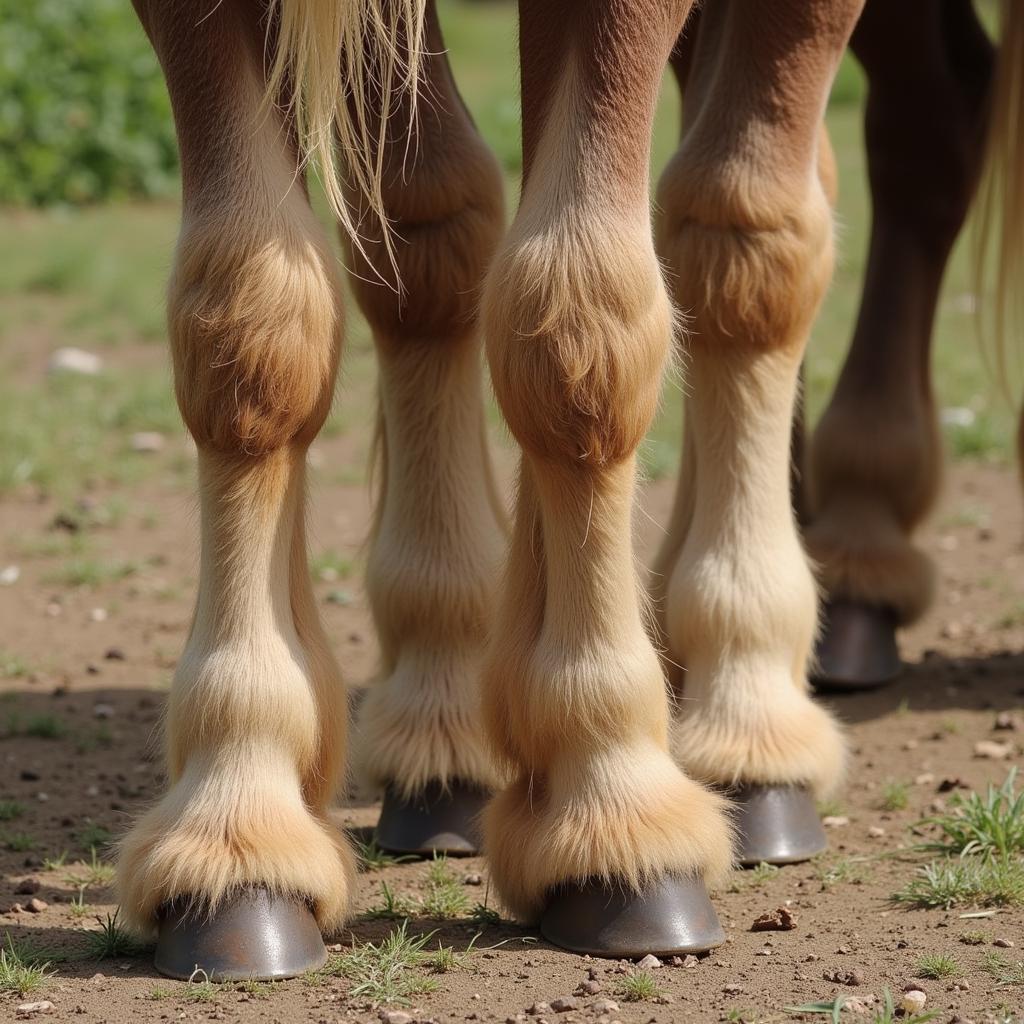Cushing’s disease, or PPID (Pituitary Pars Intermedia Dysfunction), is a common endocrine disorder in senior horses, significantly impacting their health and well-being. Managing this condition effectively often involves using cushing’s supplements horses to support their overall health and mitigate the disease’s effects. Understanding the role of these supplements is crucial for horse owners dealing with this challenging condition.
Understanding Cushing’s Disease and the Need for Supplements
Cushing’s disease in horses arises from a dysfunction in the pituitary gland, leading to an overproduction of hormones, particularly cortisol. This hormonal imbalance can manifest in a variety of symptoms, including a long, shaggy coat that doesn’t shed properly, excessive sweating, increased thirst and urination, muscle wasting, and a predisposition to infections like laminitis. Cushing’s supplements horses can play a vital role in managing these symptoms and improving the horse’s quality of life. These supplements aren’t a cure, but they can help support the horse’s metabolism, immune system, and overall well-being. Early diagnosis and appropriate management, including the use of prescribed medication and supportive cushing’s supplements horses, are crucial for mitigating the long-term effects of this disease.
 Cushing's Horse Symptoms
Cushing's Horse Symptoms
Choosing the Right Cushing’s Supplements for Your Horse
Selecting appropriate cushing’s supplements horses requires careful consideration of the horse’s individual needs and the specific symptoms they are exhibiting. Some supplements focus on supporting the immune system, while others aim to regulate metabolism or improve hoof health. It’s essential to consult with a veterinarian experienced in equine Cushing’s disease to determine the best course of action and the most suitable cushing’s supplements horses for your individual animal. They can assess your horse’s condition and recommend supplements that complement prescribed medications and address specific needs. For example, some senior horses with Cushing’s might benefit from senior horse supplements to address broader age-related concerns.
Managing Cushing’s Disease: A Holistic Approach
Managing Cushing’s disease effectively involves more than just cushing’s supplements horses. A comprehensive approach includes regular veterinary check-ups, dietary adjustments, exercise modifications, and careful hoof care. Dietary management is particularly important, as horses with Cushing’s are prone to insulin resistance and laminitis. Choosing appropriate feed, like considering oats for horses, and limiting sugary treats is crucial. Regular exercise, tailored to the horse’s capabilities, can help maintain muscle mass and overall health.
What Supplements Are Commonly Used for Cushing’s Horses?
Several types of cushing’s supplements horses are commonly used to support horses with Cushing’s disease. These include supplements that support the immune system, such as those containing antioxidants and vitamins, as well as supplements that help regulate metabolism and improve insulin sensitivity. Supplements specifically designed to support hoof health, like biotin and other nutrients, are also crucial, given the increased risk of laminitis in horses with Cushing’s. Additionally, some horse owners find insulinwise pellets for horses beneficial in managing insulin resistance. It’s important to remember that the effectiveness of these supplements can vary, and it’s always best to consult with a veterinarian before adding any new supplements to your horse’s diet.
“When managing Cushing’s in horses, a tailored approach is essential,” advises Dr. Emily Carter, DVM, specializing in equine endocrinology. “Consider the horse’s individual needs and combine appropriate medication with supportive care like tailored diets and specific supplements.”
Long-Term Care and Considerations for Cushing’s Horses
Cushing’s disease is a chronic condition that requires ongoing management. As the disease progresses, the horse’s needs may change, and adjustments to the treatment plan, including cushing’s supplements horses, may be necessary. Regular monitoring of the horse’s symptoms, bloodwork, and overall health is essential for making informed decisions about their care. It’s important to be prepared for the potential challenges of long-term care and to have open communication with your veterinarian. Sometimes, difficult decisions, such as when to euthanize a horse with cushing’s, need to be made to ensure the horse’s well-being.
“Building a strong relationship with your vet is paramount,” says Dr. Sarah Miller, an equine veterinarian with over 20 years of experience. “Open communication ensures your horse receives the best possible care throughout their Cushing’s journey.” It’s also important to remember that medications like kenalog for horses might be used for other conditions and shouldn’t be given to horses with Cushing’s without veterinary supervision due to potential contraindications.
In conclusion, managing cushing’s supplements horses requires a comprehensive and individualized approach, focusing on supporting the horse’s overall health and well-being. Working closely with a veterinarian to develop a tailored plan, including appropriate supplements, is crucial for providing the best possible care for horses with this challenging condition.
FAQ:
- What are the first signs of Cushing’s in horses?
- How is Cushing’s disease diagnosed in horses?
- What is the life expectancy of a horse with Cushing’s?
- Can Cushing’s disease in horses be cured?
- Are there any natural remedies for Cushing’s in horses?
- How much do Cushing’s supplements for horses cost?
- What are the potential side effects of Cushing’s supplements in horses?
Other questions? We encourage you to explore other articles on our website for more information on horse health and care.
Need Help? Contact us at Phone: 0772127271, Email: [email protected] or visit us at QGM2+WX2, Vị Trung, Vị Thuỷ, Hậu Giang, Việt Nam. We have a 24/7 customer support team.